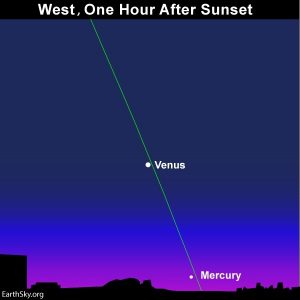See Mercury beneath Venus at dusk (earthsky.org)
Posted by Bruce McClure in Tonight | February 1, 2020
Live in the Northern Hemisphere? If so and you’ve never seen the planet Mercury – or even if you have – take advantage of your golden opportunity to see Mercury after sunset in early February 2020. This will be a fine evening apparition of Mercury for northerly latitudes. If you live in the Southern Hemisphere, you might glimpse Mercury, too, but it’ll be tougher, and you might need binoculars. The best evening view of Mercury in the Southern Hemisphere will come in September-October 2020.
No matter where you are on Earth, here’s the best way to look for Mercury. Make sure to have an unobstructed horizon in the direction of sunset, and, if possible, perch yourself on top of a hill or balcony. Search first for the blazing planet Venus, third-brightest celestial body to light up the sky, after the sun and moon. People with excellent vision might spot Venus almost immediately after sunset, but many of us will have to wait some 30 to 45 minutes after sundown to see the sky’s brightest planet. Then, as dusk deepens into darkness, look for Mercury to pop out below Venus in the western sky. Mercury will be close to the sunset point on the horizon. You might see Mercury with the eye alone within an hour after sunset. With binoculars, you can spot Mercury (and Venus) even earlier.
Don’t delay, however. At mid-northern latitudes, Mercury will follow the sun below the western horizon about 1 1/3 hours after sundown. At Earth’s equator (0 degrees latitude), Mercury will set about one hour after the sun; and at temperate latitudes in the Southern Hemisphere, Mercury will stay above the horizon for only about 45 minutes after sunset.
Click here for a sky almanac, giving you Mercury’s setting time in your sky.

***
more: https://earthsky.org/tonight/mercury-returns-to-evening-sky
